Key takeaways:
- Selective mutism is an anxiety disorder where children speak only in certain situations, often misunderstood as rudeness or stubbornness.
- Supportive mentors can create safe environments, build trust, and provide strategies to help children confront communication fears.
- Strategies like role-playing and celebrating small victories can significantly boost confidence and facilitate personal growth.
- Emotional support and constructive feedback from mentors are crucial in navigating challenges and fostering resilience.
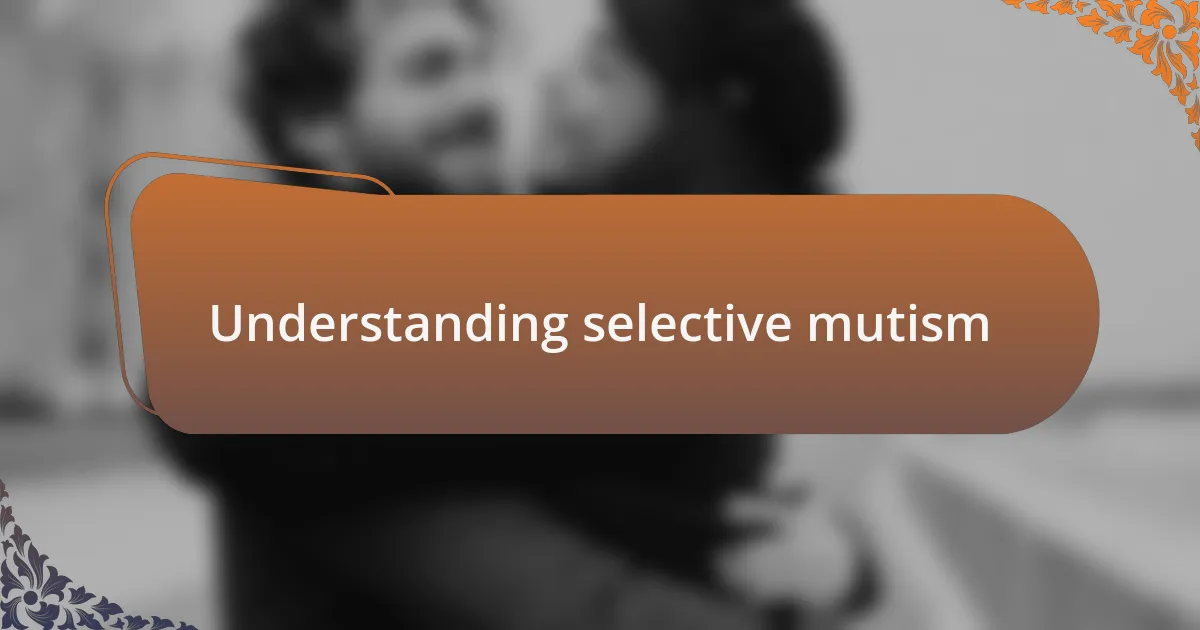
Understanding selective mutism
Selective mutism is a complex anxiety disorder that primarily affects children, leading them to speak only in certain situations or with specific people. I remember when I first encountered a child with selective mutism; her silence spoke volumes. It made me realize how overwhelming social interactions can be for them, raising questions about their inner worlds and the thoughts they are grappling with.
This condition is often misunderstood; people may mistakenly think that children are simply being stubborn or rude. However, for those experiencing selective mutism, the pressure to communicate can provoke intense fear. I recall sharing a moment with a young boy who wouldn’t speak at school but was animated and chatty at home. Witnessing that stark contrast made me appreciate the nuanced realities they face daily.
Understanding selective mutism requires empathy and patience. It made me wonder, how can we create environments that feel safe for these children? Having supportive mentors can be life-changing, fostering growth and helping them find their voice at their own pace.
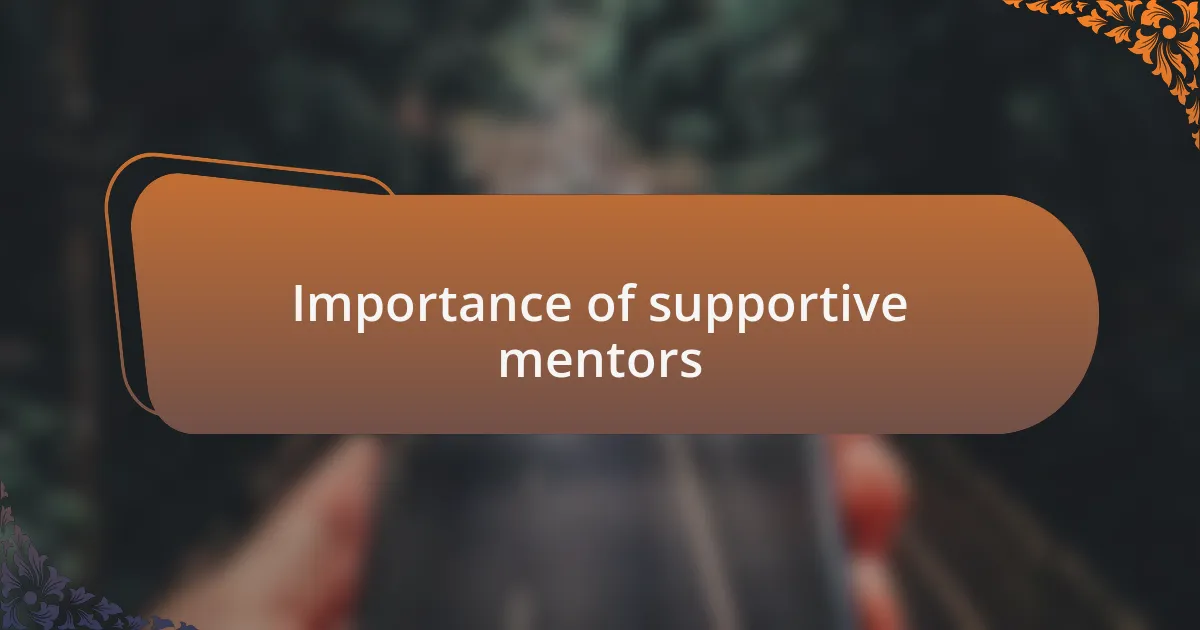
Importance of supportive mentors
Supportive mentors play a crucial role in the journey of children with selective mutism. I remember one particular mentor I had who took the time to understand my silent struggles. By creating a safe space where I could express myself without judgment, she helped me realize that my voice mattered, even if it didn’t always come out in spoken words.
Having someone who believes in you can profoundly impact self-esteem. I once had a mentee who was terrified of speaking in group settings. With gentle encouragement and plenty of patience, we worked together over several weeks. Seeing her gradually open up, first with me and then in front of others, was immensely rewarding. It showed me how vital a mentor’s role is in establishing trust and nurturing confidence.
The importance of mentors goes beyond just facilitation; they can also provide strategies that directly address anxiety. In my experience, a supportive mentor can introduce techniques like role-playing or gradually increasing exposure to social situations, all tailored to the individual’s comfort level. Have you ever felt that small nudge from someone that encouraged you to take a leap? That’s the essence of what supportive mentoring offers—it empowers children to confront their fears and embrace their voices.
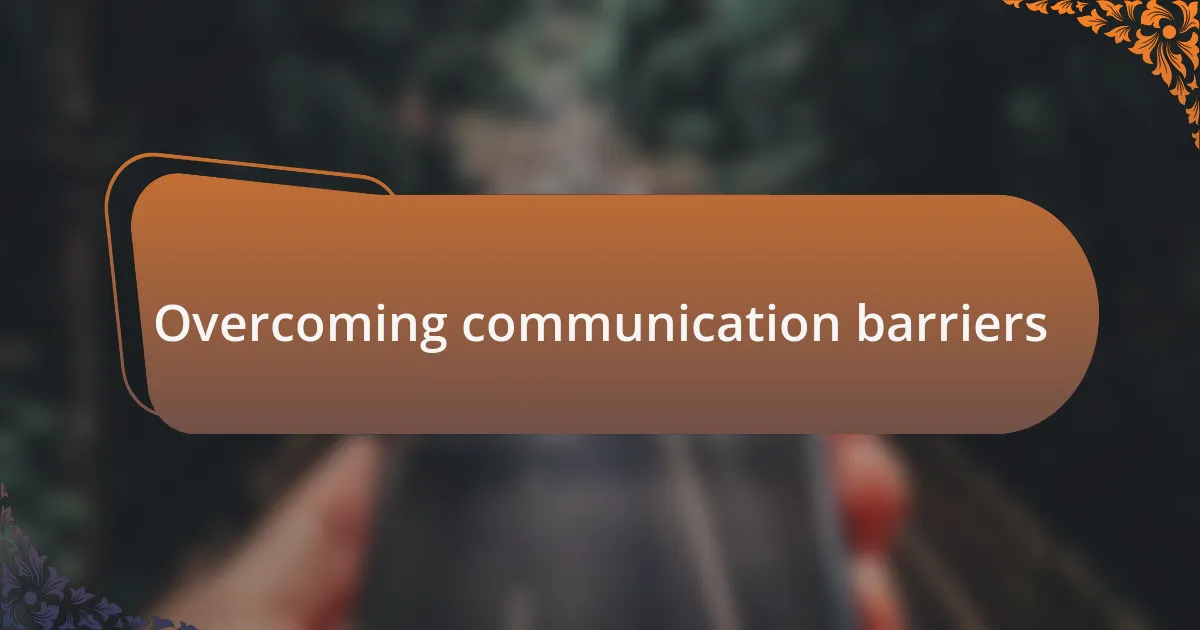
Overcoming communication barriers
Overcoming communication barriers often requires a combination of patience and creativity. I recall a time when I joined a small group activity that felt utterly overwhelming. My mentor noticed my hesitation and suggested we start with non-verbal communication games. This simple adjustment not only eased my anxiety but also sparked connections with others, bridging the gap before I was ready to speak.
Sometimes, it’s the small victories that pave the way for bigger breakthroughs. I worked with a mentee who struggled to share her thoughts in class. We instituted a “word of the day” practice, where she could express herself using just one word or phrase. This strategy built her confidence over time and taught her that even minimal contributions were valuable. Isn’t it fascinating how a single word can become a stepping stone to more extensive conversations?
Creating a welcoming environment can significantly reduce barriers. In a group setting, I vividly remember when a mentor redirected our discussions to focus on listening, urging everyone to reflect before responding. This shift not only fostered respect but allowed quieter members, including me, to feel empowered to contribute. Have you ever experienced a moment when you felt genuinely heard? That feeling can turn a daunting experience into a safe space for self-expression.
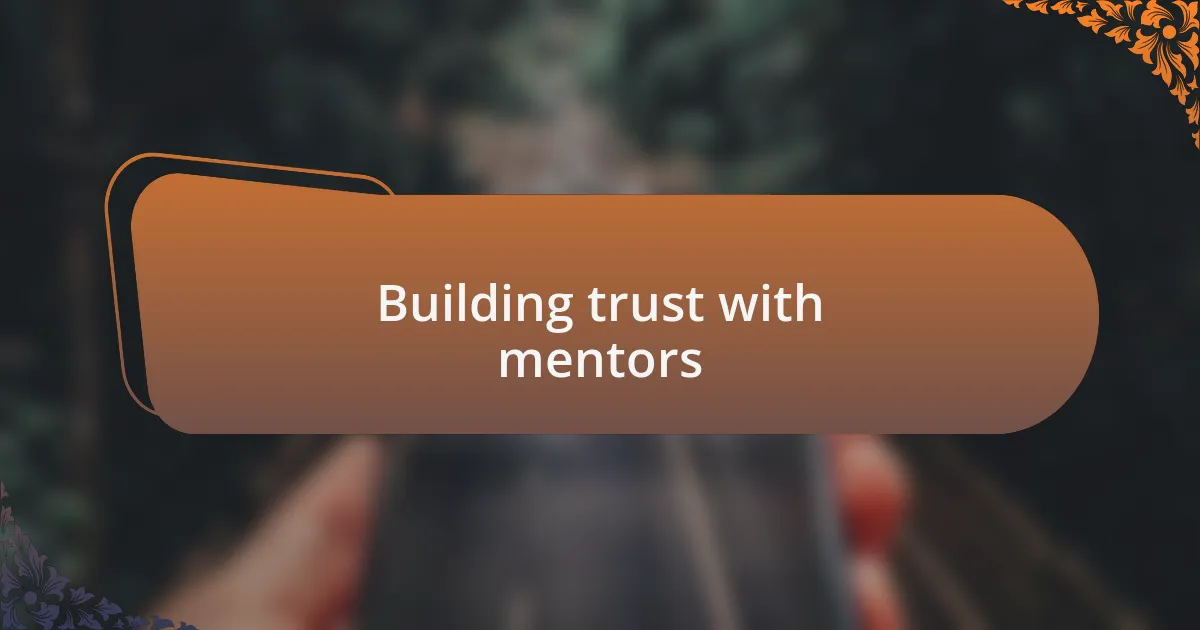
Building trust with mentors
Building trust with mentors is essential in navigating personal growth. I remember the first time I approached a mentor about my struggles with selective mutism; I was met with genuine understanding and openness. That initial conversation was a turning point, as their willingness to listen without judgment created a safe space where I could gradually share my fears and aspirations.
Establishing trust is a gradual process. I learned that consistency plays a huge role in this relationship. During my mentoring experience, I noticed how regular check-ins helped me feel valued and recognized. It made me wonder, how often do we overlook the power of simply being present for someone? Each interaction affirmed my mentor’s support, strengthening the bond we had developed.
In moments of vulnerability, I found that authenticity is the cornerstone of trust. Once, after sharing my feelings of inadequacy, my mentor opened up about their own challenges with communication. That honesty not only made me feel less isolated but also reinforced my belief that mentors are human, too. Isn’t it reassuring to know that even those guiding us have faced their own struggles? This shared experience nurtured a connection that profoundly impacted my journey.

My personal journey with mentors
Mentors have played a pivotal role in my journey, often appearing at just the right moment. I remember one mentor who encouraged me to take small, measured steps in social situations; they suggested that I practice speaking in low-pressure environments, like cafes with friendly staff. This advice seemed simple, but it was a revelation to me—how could something so minor feel so monumental?
One of the most memorable moments came when I presented a project to my mentor. My heart raced, and my voice trembled. They didn’t just listen; they engaged with my ideas enthusiastically. That day, I learned that mentors are not just guides; they are cheerleaders, and their belief in my potential lifted my confidence to new heights. Have you ever had someone believe in you so fiercely that it ignited a spark you didn’t know existed?
As I reflect on my mentoring relationships, I realize that the lessons learned often went beyond the immediate struggles with selective mutism. My mentors taught me resilience, patience, and the importance of self-compassion. I often ask myself, how different would my path have been without their guidance? The impact of their support has been immeasurable, shaping my personal growth in profound ways and teaching me to navigate the complexities of communication with newfound courage.
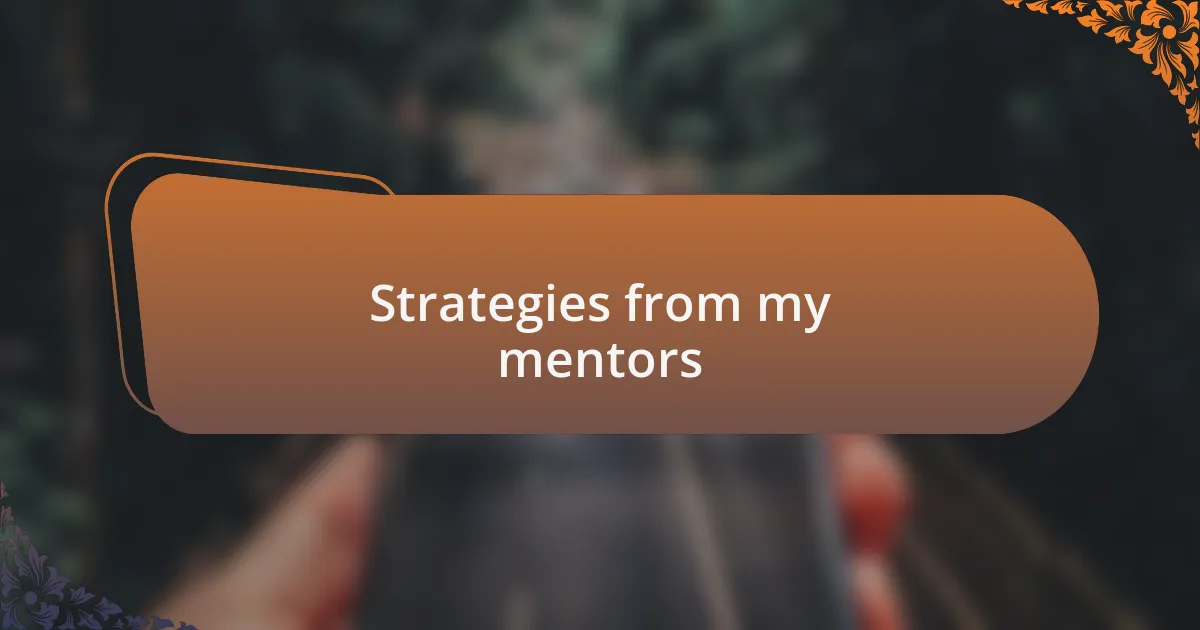
Strategies from my mentors
Sometimes, my mentors introduced me to specific exercises that seemed small but were incredibly impactful. For instance, one mentor encouraged me to write down my feelings before entering social events. This simple strategy allowed me to articulate my emotions, easing my anxiety and helping me feel more prepared. Reflecting on these writings afterward gave me clarity—have you ever realized how articulating your thoughts can make a daunting experience seem manageable?
Another effective tactic I learned from my mentors was role-playing common social scenarios. I remember vividly a session where we practiced ordering coffee. At first, my voice was barely a whisper, but with each replay, I became increasingly comfortable. The beauty of this strategy was that it provided a safe space to make mistakes without judgment. Isn’t it empowering to know there’s room to grow in a supportive environment?
I also appreciated their emphasis on celebrating small victories. One mentor would remind me to acknowledge even the tiniest successes, like making eye contact or speaking a full sentence. This approach shifted my focus from fear to progress, reinforcing the idea that each step counts. Have you ever found joy in celebrating your accomplishments, no matter how small? It’s remarkable how this practice can boost motivation and resilience on the journey toward overcoming challenges.
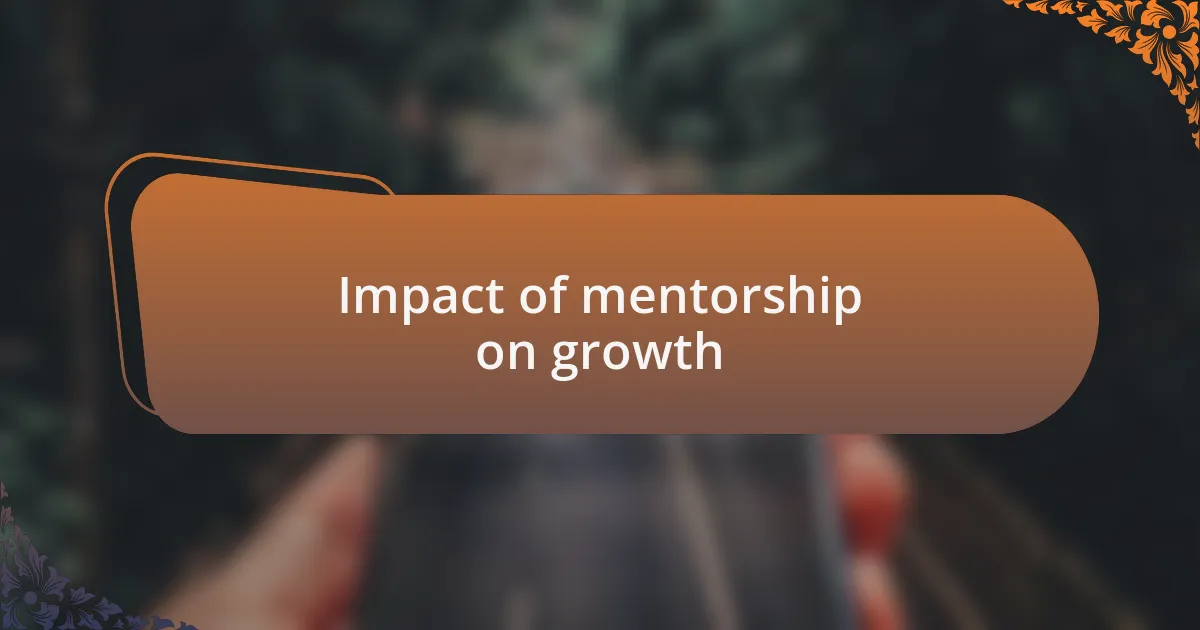
Impact of mentorship on growth
The influence of mentorship on personal growth has been profound in my journey. I recall a moment when a mentor guided me to confront my fears directly by engaging in public speaking groups. Facing a crowd, my heart raced, yet the encouragement from my mentor made me feel capable. Isn’t it remarkable how just one person believing in you can shift your entire perspective?
Another impactful experience came from my mentor’s practice of constructive feedback. One day, after a particularly challenging interaction with peers, my mentor sat down with me to dissect what went well and what didn’t. That dialogue not only highlighted areas for improvement but also illuminated my strengths. Have you ever experienced that kind of clarity? It’s transformative to see yourself through another’s eyes, isn’t it?
Perhaps the most significant aspect of mentorship lies in the emotional support it fosters. I remember during moments of self-doubt, my mentor would share their own struggles, normalizing my experience. This connection helped me feel that I wasn’t alone in my journey. How powerful is it to share vulnerabilities? It’s a reminder that growth isn’t just about skills; it’s about fostering resilience through relationships.